2019英语六级作文必背范文:文化教育话题
2019英语六级作文预测范文:国学
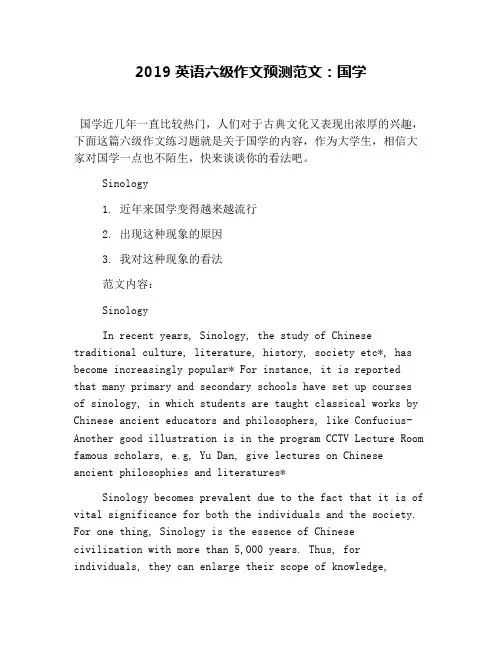
2019英语六级作文预测范文:国学国学近几年一直比较热门,人们对于古典文化又表现出浓厚的兴趣,下面这篇六级作文练习题就是关于国学的内容,作为大学生,相信大家对国学一点也不陌生,快来谈谈你的看法吧。
Sinology1. 近年来国学变得越来越流行2. 出现这种现象的原因3. 我对这种现象的看法范文内容:SinologyIn recent years, Sinology, the study of Chinese traditional culture, literature, history, society etc*, has become increasingly popular* For instance, it is reportedthat many primary and secondary schools have set up courses of sinology, in which students are taught classical works by Chinese ancient educators and philosophers, like Confucius- Another good illustration is in the program CCTV Lecture Room famous scholars, e.g, Yu Dan, give lectures on Chinese ancient philosophies and literatures*Sinology becomes prevalent due to the fact that it is of vital significance for both the individuals and the society. For one thing, Sinology is the essence of Chinesecivilization with more than 5,000 years. Thus, for individuals, they can enlarge their scope of knowledge,enrich their experience and adapt themselves to the complicated society. For another, it is acknowledged that the rehabilitation of Sinology can contribute to the establishment of a harmonious society.In my opinion, all Chinese people should inherit the merits of Sinology. To do so, we can read books by ourselves or to attend lectures on this issue. Besides, we have the obUgation to popularize introducing it to the world* By doing so, we can not only inherit it but also make it glorious and prosperous.以上作文练习完以后,希望考生能够熟读范文,并总结范文的模板已被考试的时候用,考前时间不多了,大家不要放松复习哦!只要努力,相信大家都能取得理想成绩!。
文化教育英语作文
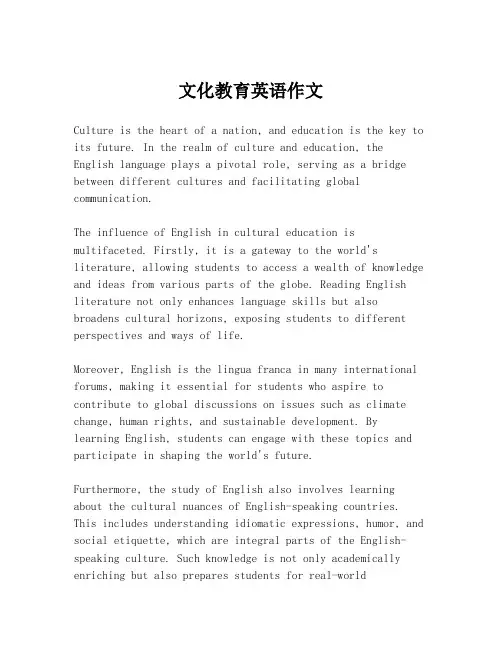
文化教育英语作文Culture is the heart of a nation, and education is the key to its future. In the realm of culture and education, the English language plays a pivotal role, serving as a bridge between different cultures and facilitating global communication.The influence of English in cultural education is multifaceted. Firstly, it is a gateway to the world's literature, allowing students to access a wealth of knowledge and ideas from various parts of the globe. Reading English literature not only enhances language skills but also broadens cultural horizons, exposing students to different perspectives and ways of life.Moreover, English is the lingua franca in many international forums, making it essential for students who aspire to contribute to global discussions on issues such as climate change, human rights, and sustainable development. By learning English, students can engage with these topics and participate in shaping the world's future.Furthermore, the study of English also involves learning about the cultural nuances of English-speaking countries. This includes understanding idiomatic expressions, humor, and social etiquette, which are integral parts of the English-speaking culture. Such knowledge is not only academically enriching but also prepares students for real-worldinteractions with people from diverse backgrounds.In addition, the integration of technology in English education has revolutionized the way students learn. Online platforms, digital libraries, and multimedia resources have made English learning more accessible and interactive. Students can now practice their language skills throughvirtual exchanges with native speakers, watch English-language films and series, and engage in online discussions.However, it is also important to recognize the challengesthat come with the dominance of English in cultural education. The risk of cultural homogenization and the potential loss of one's native language and culture are real concerns. Therefore, it is crucial to strike a balance betweenembracing English as a tool for global communication and preserving one's cultural identity.In conclusion, the role of English in cultural education is significant and multi-dimensional. It offers a window to the world, a means to engage with global issues, and a tool for personal and professional development. As educators, it isour responsibility to guide students in navigating this complex landscape, ensuring that they become not onlyproficient in English but also proud ambassadors of their own culture.。
文化的英语六级作文
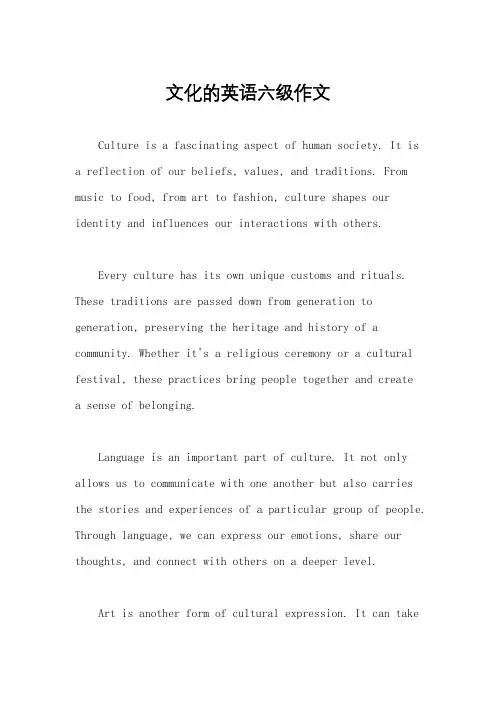
文化的英语六级作文Culture is a fascinating aspect of human society. It is a reflection of our beliefs, values, and traditions. From music to food, from art to fashion, culture shapes our identity and influences our interactions with others.Every culture has its own unique customs and rituals. These traditions are passed down from generation to generation, preserving the heritage and history of a community. Whether it's a religious ceremony or a cultural festival, these practices bring people together and createa sense of belonging.Language is an important part of culture. It not only allows us to communicate with one another but also carries the stories and experiences of a particular group of people. Through language, we can express our emotions, share our thoughts, and connect with others on a deeper level.Art is another form of cultural expression. It can takemany forms, such as painting, sculpture, dance, and theater. Art allows us to explore our creativity, express our emotions, and challenge our perceptions of the world around us. It is a powerful tool for self-expression and communication.Food is a universal language that transcends bordersand brings people together. Each culture has its own unique cuisine, flavors, and cooking techniques. Food not only nourishes our bodies but also nourishes our souls, connecting us to our roots and heritage.In today's globalized world, cultures are constantly interacting and influencing one another. This cultural exchange enriches our lives and broadens our perspectives.It allows us to appreciate the diversity of the human experience and learn from one another's traditions and practices.In conclusion, culture is a dynamic and ever-evolving aspect of human society. It shapes our identity, influences our interactions, and connects us to our past and present.Embracing and celebrating our cultural differences can help us build a more inclusive and harmonious world.。
中国文化六级英语作文
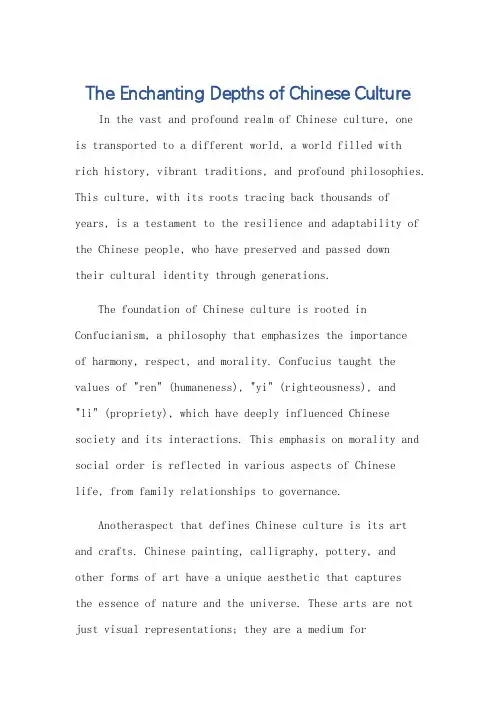
The Enchanting Depths of Chinese CultureIn the vast and profound realm of Chinese culture, oneis transported to a different world, a world filled withrich history, vibrant traditions, and profound philosophies. This culture, with its roots tracing back thousands of years, is a testament to the resilience and adaptability of the Chinese people, who have preserved and passed downtheir cultural identity through generations.The foundation of Chinese culture is rooted in Confucianism, a philosophy that emphasizes the importanceof harmony, respect, and morality. Confucius taught the values of "ren" (humaneness), "yi" (righteousness), and "li" (propriety), which have deeply influenced Chinese society and its interactions. This emphasis on morality and social order is reflected in various aspects of Chineselife, from family relationships to governance.Anotheraspect that defines Chinese culture is its art and crafts. Chinese painting, calligraphy, pottery, and other forms of art have a unique aesthetic that capturesthe essence of nature and the universe. These arts are not just visual representations; they are a medium forexpressing feelings and philosophies. The calligraphy, for instance, is not just about writing; it is about expressing one's inner world and connecting with the universe through the flow of ink and brushstrokes.Food is also a crucial component of Chinese culture. Chinese cuisine, with its diverse flavors and cooking techniques, is a testament to the creativity and resourcefulness of the Chinese people. Each region in China has its unique cuisine, reflecting the local climate, availability of ingredients, and cultural traditions. The preparation of food is often a family affair, with generations of knowledge and skills passed down through the years.Festivals and traditions are another integral part of Chinese culture. The Chinese calendar is filled with various festivals and celebrations, each markingsignificant moments in history or marking changes in the natural world. The Spring Festival, for instance, is a time for family reunions and new beginnings, while the Dragon Boat Festival commemorates the ancient poet Qu Yuan and features the exciting dragon boat races.In conclusion, Chinese culture is a rich andmultifaceted phenomenon that encompasses philosophy, art, cuisine, and traditions. It is a culture that is constantly evolving and adapting to new challenges and opportunities, while remaining true to its ancient roots. As we delve into the enchanting depths of Chinese culture, we are remindedof the beauty and wisdom that lie within its vast and profound realm.**中国文化的迷人之处**在中国文化的广阔而深邃的领域中,人们仿佛被带入了一个与众不同的世界,这个世界充满了丰富的历史、生机勃勃的传统和深刻的哲学思想。
2019年6月六级易考范文-Integrate Chinese Culture into...
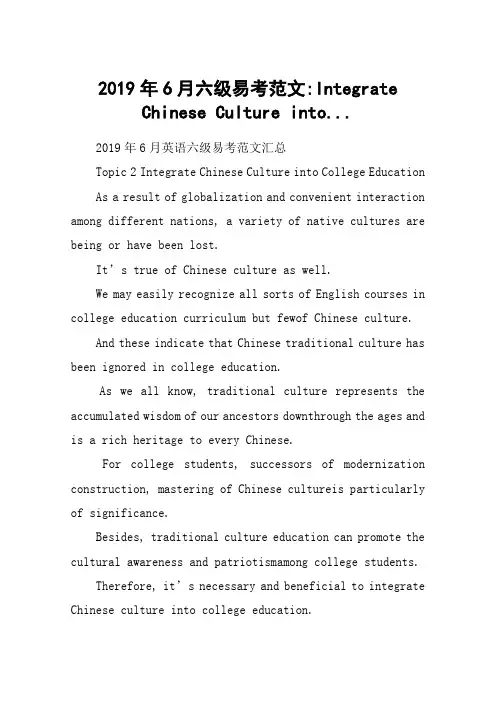
2019年6月六级易考范文:IntegrateChinese Culture into...2019年6月英语六级易考范文汇总Topic 2 Integrate Chinese Culture into College Education As a result of globalization and convenient interaction among different nations, a variety of native cultures are being or have been lost.It’s true of Chinese culture as well.We may easily recognize all sorts of English courses in college education curriculum but fewof Chinese culture.And these indicate that Chinese traditional culture has been ignored in college education.As we all know, traditional culture represents the accumulated wisdom of our ancestors downthrough the ages and is a rich heritage to every Chinese.For college students, successors of modernization construction, mastering of Chinese cultureis particularly of significance.Besides, traditional culture education can promote the cultural awareness and patriotismamong college students.Therefore, it’s necessary and beneficial to integrate Chinese culture into college education.To achieve this, colleges and universities should take effective measures to preserve thenative culture.Cultural awareness should be promoted both through the courses and extracurricularactivities.As for college students, we should actively be involved in the culture education.。
六级文化类英语作文
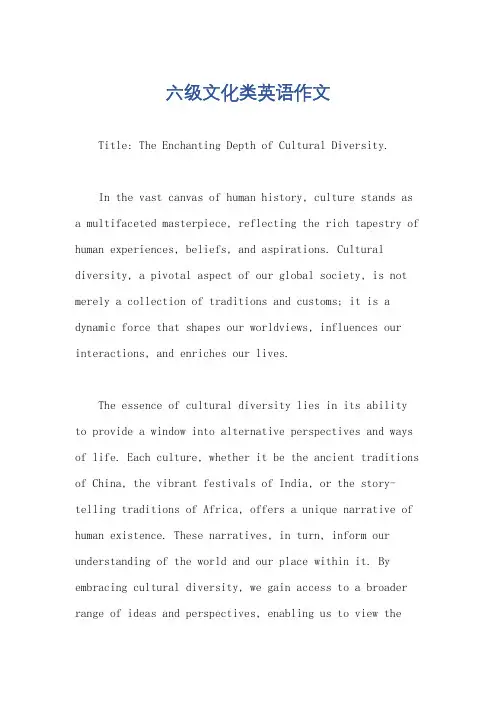
六级文化类英语作文Title: The Enchanting Depth of Cultural Diversity.In the vast canvas of human history, culture stands as a multifaceted masterpiece, reflecting the rich tapestry of human experiences, beliefs, and aspirations. Cultural diversity, a pivotal aspect of our global society, is not merely a collection of traditions and customs; it is a dynamic force that shapes our worldviews, influences our interactions, and enriches our lives.The essence of cultural diversity lies in its ability to provide a window into alternative perspectives and ways of life. Each culture, whether it be the ancient traditions of China, the vibrant festivals of India, or the story-telling traditions of Africa, offers a unique narrative of human existence. These narratives, in turn, inform our understanding of the world and our place within it. By embracing cultural diversity, we gain access to a broader range of ideas and perspectives, enabling us to view theworld with greater complexity and empathy.Moreover, cultural diversity fosters creativity and innovation. When diverse cultures come into contact, they碰撞思想,激发创新。
六级文化类作文模板范文
六级文化类作文模板范文英文回答:Culture's Power in Shaping Human Lives。
Culture plays a pivotal role in shaping the lives of individuals, influencing their beliefs, values, behaviors, and overall worldview. It acts as a complex web of shared traditions, customs, norms, and beliefs that bind members of a society together and distinguish them from others. Throughout history, culture has been a potent force in shaping societies and individuals, leaving an enduring mark on human civilization.One of the most profound ways in which culture influences individuals is by providing them with a sense of identity and belonging. Culture defines what it means to be a member of a particular group, providing individuals with a shared set of values, beliefs, and practices that they can identify with. This sense of belonging can foster astrong sense of community and provide individuals with a feeling of purpose and meaning in life.Moreover, culture shapes the way individuals perceive and interact with the world around them. It influencestheir cognitive processes, such as how they categorize and make sense of information, solve problems, and make decisions. Culture also shapes their emotional experiences and responses, influencing how they express and regulate their emotions. For instance, in some cultures, it is considered acceptable to express emotions openly, while in others, it is expected to maintain a more reserved demeanor.Furthermore, culture influences individuals' behaviors and actions. It establishes norms and rules that govern how people should behave in different situations. These norms can range from expectations about appropriate dress and etiquette to more complex moral and ethical codes. By conforming to these norms, individuals gain acceptance and avoid social disapproval. Culture also shapes individuals' aspirations and goals, influencing what they consider to be valuable and worthy of pursuit.Culture's influence extends beyond individual lives, shaping the fabric of societies as a whole. It provides a common foundation for social cohesion and cooperation, fostering a sense of shared purpose and direction. Culture also influences the development of institutions, laws, and social structures, which in turn shape the lives of individuals. For example, in societies with a strong emphasis on individualism, individual rights and freedoms may be highly valued, while in collectivist societies, the needs of the group may take precedence over individual interests.In conclusion, culture is a powerful force that plays a multifaceted role in shaping human lives. It provides individuals with a sense of identity, belonging, and meaning while influencing their cognitive processes, emotions, behaviors, and aspirations. Culture also shapes societies as a whole, fostering social cohesion, cooperation, and the development of institutions and laws. Understanding the power and influence of culture is crucial for appreciating the diversity and complexity of humanexistence.中文回答:文化塑造人类生活的力量。
英语六级作文关于文化
英语六级作文关于文化Certainly! Here's a sample essay on culture for your English CET-6 writing:---。
Title: The Significance of Cultural Exchange in a Globalized World。
In today's interconnected world, the exchange ofculture plays a pivotal role in shaping societies and fostering mutual understanding among nations. Cultural exchange not only enriches individuals but also promotes peace and cooperation on a global scale.First and foremost, cultural exchange facilitates the appreciation and understanding of diverse traditions, customs, and values. Through exposure to different cultures, individuals gain insights into alternative ways of life, broadening their perspectives and cultivating empathytowards others. This cross-cultural empathy is essential in fostering tolerance and harmony in multicultural societies.Moreover, cultural exchange serves as a bridge between nations, transcending geographical boundaries and diplomatic barriers. By sharing artistic expressions, language, cuisine, and traditions, countries forge bonds of friendship and mutual respect. These connections lay the groundwork for diplomatic dialogue and collaboration, contributing to the resolution of conflicts and the advancement of shared goals, such as environmental sustainability and economic development.Furthermore, cultural exchange stimulates creativity and innovation by encouraging the fusion of ideas and practices from diverse cultural backgrounds. When individuals from different cultures come together, they bring with them unique perspectives and approaches, sparking creativity and driving progress in various fields, including art, science, and technology. This cultural synergy not only fuels innovation but also fosters a dynamic and vibrant global community.Additionally, cultural exchange promotes economic growth and prosperity by fostering tourism, trade, and investment. Countries rich in cultural heritage attract visitors from around the world, generating revenue and creating jobs in the tourism industry. Furthermore, the exchange of goods and services between nations strengthens economic ties and stimulates trade, leading to mutual prosperity and development.In conclusion, cultural exchange is indispensable in today's globalized world, serving as a catalyst for mutual understanding, peace, and progress. By embracing cultural diversity and fostering dialogue among nations, we can build a more inclusive and harmonious world for future generations.--。
六级文化类英语作文
六级文化类英语作文In the fast-paced and constantly evolving world of today, the significance of traditional culture often goes unnoticed. However, its impact on our lives, both individually and collectively, is immeasurable. This essay delves into the vital role of traditional culture in modern society, exploring its role in identity formation, community cohesion, and global understanding.Firstly, traditional culture plays a crucial role in shaping individual identity. Culture is a powerful toolthat helps us define who we are and where we come from. It is a reflection of our values, beliefs, and histories, passed down through generations. By embracing our cultural heritage, we are able to connect with our ancestors and understand our place within the larger context of humanity. This understanding, in turn, helps us to develop a sense of purpose and belonging, essential for our psychologicalwell-being.Moreover, traditional culture plays a pivotal role in community cohesion. Cultural practices, such as festivals, traditions, and rituals, act as powerful binding agentsthat bring people together. These shared experiences create a sense of collective identity and purpose, fostering a sense of unity and belonging among community members. In an increasingly globalized world, where cultural diversity is the norm, these shared practices become even more important in promoting unity and understanding among diverse groups. Additionally, traditional culture has a profound impact on global understanding and harmonious coexistence. By understanding and respecting the cultural practices of others, we are able to bridge the gaps of misunderstanding and prejudice that often lead to conflict. Cultural exchange and understanding can foster a sense of empathy and compassion, leading to more harmonious and inclusive societies.In conclusion, traditional culture is an indispensable part of modern society. It shapes our identities, binds communities, and fosters global understanding. As we move forward in this ever-changing world, it is crucial that we preserve and honor our cultural heritage, allowing it to continue to thrive and influence future generations. Bydoing so, we not only honor our past but also contribute to the building of a more inclusive and harmonious world.**传统文化在现代社会中的力量**在当今快速变化和不断发展的世界中,传统文化的重要性常常被人们忽视。
文化教育 英语作文
文化教育英语作文英文回答:Culture and education are two sides of the same coin. They are intertwined and mutually dependent. Culture shapes our education, and education shapes our culture.Culture refers to the beliefs, values, traditions, and practices of a particular group of people. It is the lens through which we see the world and make sense of our experiences. Education, on the other hand, is the process of acquiring knowledge, skills, and attitudes. It helps us to develop our intellectual, emotional, and physical capacities.Culture influences education in many ways. First, it determines what is considered to be knowledge. In some cultures, for example, religious texts are considered to be the ultimate source of knowledge, while in other cultures, scientific evidence is given more weight. Second, cultureinfluences the way that knowledge is taught. In some cultures, education is highly formal and structured, whilein other cultures, it is more informal and experiential. Third, culture influences the way that knowledge is assessed. In some cultures, students are expected to memorize facts and regurgitate them on exams, while inother cultures, they are encouraged to think critically and solve problems.Education, in turn, shapes culture. When people are educated, they are more likely to be critical thinkers and problem solvers. They are also more likely to be tolerantof different perspectives and cultures. Education can also help to preserve and transmit culture from one generationto the next.Let me give you an example of how culture and education interact. In the United States, the culture places a high value on individualism and competition. This is reflectedin the education system, which emphasizes individual achievement and standardized testing. In contrast, in Japan, the culture places a high value on collectivism andcooperation. This is reflected in the education system, which emphasizes group work and consensus-building.The relationship between culture and education is complex and multifaceted. However, it is clear that these two forces are inextricably linked. Culture shapes our education, and education shapes our culture. By understanding the relationship between these two forces, we can better understand ourselves and the world around us.中文回答:文化和教育是一枚硬币的两面,它们相互交织,相互依赖。
- 1、下载文档前请自行甄别文档内容的完整性,平台不提供额外的编辑、内容补充、找答案等附加服务。
- 2、"仅部分预览"的文档,不可在线预览部分如存在完整性等问题,可反馈申请退款(可完整预览的文档不适用该条件!)。
- 3、如文档侵犯您的权益,请联系客服反馈,我们会尽快为您处理(人工客服工作时间:9:00-18:30)。
2019英语六级作文必背范文:文化教育话题
英语四六级作文必背范文2:文化教育话题
这类话题包括论传统文化的六十、海外留学等,这类话题最近几年没怎么考过,同学们要引起重视。
From the cartoon given above, we can observe that there are two people watching Peking Opera. With the actress performing vividly on the stage, the old man is watching attentively. However, the little boy sitting beside does not even cast a glance at the actress and falls sleepy. It is obvious that he shows no interest in Peking Opera.
The cartoon reflects an interesting and usual respect of daily life. However, from a deeper perspectives, it also reveals the gradual loss of traditional culture in modern society. What exactly contribute to this phenomenon ? Possible reasons could be listed as follows: for one thing, quite a few people, especially youngsters, hold that Chinese traditional culture is out-dated and of little use in modern society. Perhaps, from their perspective, traditional culture form the distant past can hardly adapt to or keep pace with the ever-changing new world. Moreover, exotic cultures, to some extent, have also posed a great challenge to the traditional culture of China. As we can see, a large body of people have been attracted by foreign cultures which feature diversity, novelty and richness —Crazy fans of foreign TV programs, electronic products or even ways of life abound in our daily life.
However, no one can deny the significance of Chinese traditional culture. It is the crystallization of Chinese
wisdom and civilization. An individual or nation showing no respect to the essence of traditional culture cannot be expected to develop and be stronger. Hence, something could and should be done to reverse the inexorable decline in the emphasis of Chinese traditional culture. (263)
参考译文:
如上图所示,我们能够看到有两个人正在看京剧。
当女演员生动
地在舞台上表演,老者专心致志地看着。
不过,坐在边上的小男孩甚
至都没有瞥一眼女演员并且睡着了。
很明显,他对京剧没有什么兴趣。
这幅图画反应了日常生活中有趣而又平常的一面。
不过,从更为
深层的角度来看,它也揭示了现代社会中的传统文化的流失。
是什么
导致了这个现象?是什么导致了这个现象?可能的理由能够罗列如下:
首先,相当多的人,尤其是年轻人,认为中国传统文化在现代社会中
过时而且没有什么用了。
也许,在他们看来,来自遥远的过去的传统
文化几乎是不能适合和跟得上持续变化的新世界的。
再者,外来文化
也在某种水准上对传统文化造成了巨大的威胁。
正如我们所能看见的,相当多的人已经被以多样性、新颖性和丰富性为特征的国外文化吸引了—对国外电视节目,电子产品甚至是生活方式狂热的粉丝在我们
生活中比比皆是。
不过,没有人能够否认传统文化的重要性。
它是中国智慧和文明
的结晶。
一个不尊重传统文化的精髓的民族和个人是无法发展和强大的。
所以,我们能够也应该做一些事情,来扭转现在人们对中国传统
文化的重视的不可遏制的下降。
